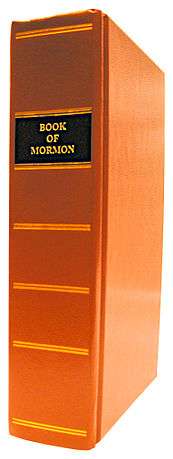Book of Jacob
 |
| Books of the Book of Mormon |
|
| See also |
|
The Book of Jacob is the third book of the Book of Mormon. Its full title is The Book of Jacob: The Brother of Nephi. According to the text, it was written by the ancient prophet Jacob. The purpose of the book, in his own words, is to persuade all men to "come unto Christ" (Jacob 1:7). While this book contains some history of the Nephites, including the death of Nephi, it is mainly a record of Jacob's preachings to his people. Chapter 5 contains The Parable of the Olive Tree, a lengthy allegory of the scattering and gathering of Israel, comparing the Israelites and gentiles to tame and wild olive trees, respectively.
Narrative
In 545 BCE it was the turn for Nephi's brother Jacob to write on the plates, because Nephi had grown old and he saw that he was soon to die. The people were so happy with King Nephi that they wanted to call the next king Nephi II, and then Nephi III, and so on. Jacob writes that all the Jacobites, Josephites, and Zoramites were called Nephites together with the actual Nephites, and opposed to them were all the Lemuelites and Ishmaelites who were called Lamanites together with the actual Lamanites.
And the Nephites began to be lifted up in pride because they had been so blessed by God, and this led them to do wicked things. But Jacob and his brother Joseph tried as hard as they could to teach the people not to do wicked things, because if they didn't, they (Jacob and Joseph) would receive all the blame for their wickedness on the last day. "...otherwise their blood would come upon our garments, and we would not be found spotless at the last day."
Jacob went to the temple to teach the Nephites. This temple was a copy of the one Solomon made in Jerusalem. Jacob said the people had begun to search for gold and silver. And some of them were better searchers than others, so they enhanced their apparel to show off that they were more ambitious and competent than their brothers. Jacob said, "Think of your brethren like unto yourselves, and be familiar with all and free with your substance, that they may be rich like unto you."
After that Jacob preached against the practice of polygamy: "Wherefore, my brethren, hear me, and hearken to the word of the Lord: For there shall not any man among you have save it be one wife; and concubines he shall have none."
Jacob then prophesied about events which would be fulfilled at the end of the Book of Mormon, around 385 AD, when the Nephites would be completely fallen away from God and wiped out to the last man by the Lamanites. In a parable he describes a master gardener who takes a twig from the tree in America, representing the Church of Jesus Christ of Latter Day Saints, and grafts it back into a tree with wild branches, representing mainline Christianity, to see what happens, because the roots of that tree were still good. He was to set his handful of servants to work pruning bad branches to make room for the growth of the good, and when the time was ripe he planned to graft the natural branches, representing the Jews, back in again.
At last the tree in Jacob's vision was completely healthy again, and bearing nothing but natural fruit, with the Jews and mainline Christians and Mormons in complete unity, but in the vision the master predicted that a time would come again when evil fruit would be seen on his tree again but in that time he would gather all the fruit, both good and bad, and keep the good fruit for himself, but cast the bad fruit away, and then he would burn the whole vineyard down with fire.
After a number of years a man named Sherem went around saying there would be no Christ, and for Jacob to preach the gospel of Christ instead of adherence to the law of Moses was blasphemy. Jacob asserted that every prophecy ever made was really about Christ, and that it was revealed to him that if Christ does not make atonement, all humanity will be lost. Sherem demanded a sign to prove what Jacob said was true.
Jacob put on a great show of pious humility, saying who was he to tempt God to show a sign, nevertheless, "...if God shall smite thee, let that be a sign unto thee that he has power, both in heaven and in earth; and also, that Christ shall come."
And immediately God smote Sherem, making him fall unconscious for many days. When he eventually regained consciousness, he asked for the people to be assembled so he could make his last sermon. He confessed Christ, and said he had been deceived by the devil, and retracted everything he said about Jacob. He said he feared that he had committed the unpardonable sin, which is lying to God. Then he died.
When Jacob finished writing on the plates he bequeathed them to his son Enos.
Further reading
- Nyman, Monte (1990), The Book of Mormon: Jacob through Words of Mormon, To Learn with Joy, BYU, ISBN 0-8849-4734-3
- Thompson, Keith (2015), "Who Was Sherem?", Interpreter: A Journal of Mormon Scripture, 14 (1)
- Williams, Clyde J. (1992), "Book of Mormon: Book of Jacob", in Ludlow, Daniel H, Encyclopedia of Mormonism, New York: Macmillan Publishing, pp. 147–148, ISBN 0-02-879602-0, OCLC 24502140